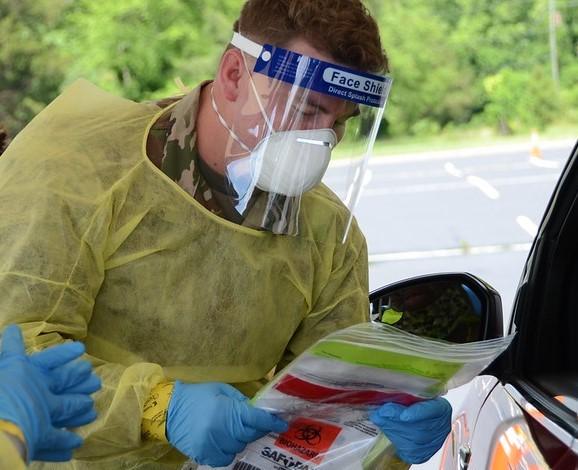Late Monday the Centers for Disease Control and Prevention (CDC) changed technical language on its website on who should get a COVID-19 test, a move that has baffled public health officials.
"If you have been in close contact (within 6 feet) of a person with a COVID-19 infection for at least 15 minutes but do not have symptoms, you do not necessarily need a test unless you are a vulnerable individual or your health care provider or State or local public health officials recommend you take one," the guidelines now read, in contrast to the previous recommendation, which called for testing all close case contacts.
Today, CNN broke the news that the decision to change the wording was made not by the CDC, but by top government officials from the Department of Health and Human Services (HHS), and could even reach the White House, where President Donald Trump has made clear he believes the United States is doing too much testing for the novel coronavirus.
For Patrick McConnon, MPH, who worked at the CDC for 39 years, the guideline's language is baffling.
"This is atypical of any language I've seen coming from the CDC," McConnon told CIDRAP News. "I've never seen something so equivocating as, 'you do not necessarily need a test.' Well, what should someone do if they get a call from a contact tracer and are told they have been exposed?"
McConnon said the language punts the decision-making process further down the line from the CDC, and portrays testing case contacts as something that is up for discussion, or debate. One of his many roles with the CDC was as head of the Emerging and Reemerging Infectious Disease Program from 1994 to 2002.
Eroded confidence, but no impact on contact tracing
The change, made without any rationale or explanation, further erodes the scientific community's confidence in the CDC. For months, the story has been more—not less—testing could only help control the world's worst outbreak of the virus.
"If this is coming from HHS, it really undermines the CDC," said Amesh Adalja, MD, a senior scholar with the Johns Hopkins University Center for Health Security.
"I can think of no reason you wouldn't want people to access the test if they think there's good reason you need one," said Emily Gurley, PhD, an epidemiologist with the Bloomberg School of Public Health at Johns Hopkins. "If nationally the CDC were making the argument that we have to make this decision because of limited tests, that's one thing, but there's no evidence or real justification provided."
Both Adalja and Gurley said the new CDC language does not in any way alter the requirements of contact tracing, which state that all known case contacts should self-quarantine 14 days after an exposure. That recommendation holds, with or without testing.
"If you are deemed a significant exposure, you self-quarantine for 14 days," said Adalja. "A test only gives you an answer for one moment in time. A negative on day 6 doesn't mean you won't be positive for day 8."
Gurley agreed. "Some people make [the] mistake of thinking that if they get a negative [test] they don't have to quarantine," she said.
Though the change in language on testing does not change self-quarantine recommendations, experts are still concerned that the language moves the US backwards, and not forwards, in its fight against COVID-19.
Jeff Duchin, MD, the health officer for Public Health Seattle and King County, Washington, said he completely agrees that testing asymptomatic people who do not have an exposure to COVID-19 is not appropriate. But not testing known case contacts is another story.
"Testing asymptomatic close contacts of COVID-19 cases is important to identify cases and interrupt transmission and we intend to continue to do that pending additional information that would lead us to reconsider," Duchin told CIDRAP News.
Death count approaches 180,000
The country reported 37,986 new COVID-19 cases yesterday, and 1,234 deaths, according to the Johns Hopkins COVID-19 tracker, bringing the national total to 5,800,472 cases and 179,150 deaths.
In other US developments, the president of the University of Iowa wrote an open letter to Iowa City business owners, including bar owners, admonishing them for not following social distancing rules and guidelines. The university reported Monday that 111 students and staff have tested positive for COVID-19.
"Over the past two weeks, I have been exceedingly disappointed in some of the downtown Iowa City businesses and your choices to disregard the proclamation from the governor," the letter said. "These actions have led to an increase in the transmission of COVID-19 in our community, and we, as a community, will now have to respond."
In related news, the New York Times published a survey of more than 1,500 colleges and universities, which shows at least 26,000 COVID-19 cases and 64 deaths since the pandemic began.























